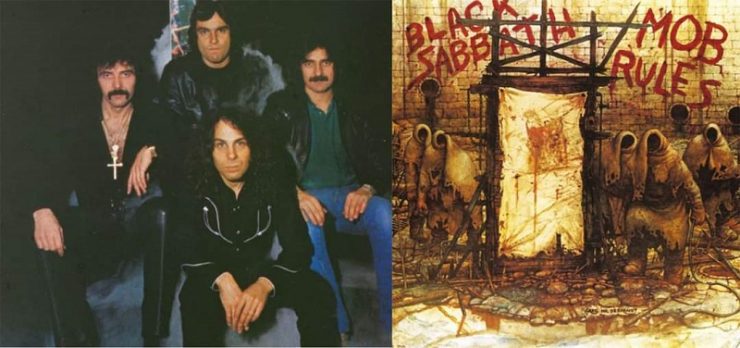BLACK SABBATH released their 10th studio album Mob Rules on November 4, 1981 through the Vertigo label. The album followed 1980’s Heaven and Hell, and was the second and last Black Sabbath studio album to feature lead vocalist Ronnie James Dio prior to 1992’s Dehumanizer.
Produced and recorded by Martin Birch, the album received an expanded edition release in 2010. Black Sabbath’s first new recording after Heaven and Hell was a version of the title track “The Mob Rules” for the Heavy Metal film soundtrack. The song “E5150” is also heard in the film but is not included on the soundtrack.
According to Tony Iommi’s autobiography, Iron Man: My Journey Through Heaven & Hell with Black Sabbath, the band began writing and rehearsing songs for Mob Rules in a rented house on Toluca Lake in Los Angeles. Initially the band hoped to record in their own studio to save money and actually purchased a sound table; but, according to Iommi, “We literally couldn’t get any guitar sound.
We tried it in the studio. We tried it in the hallway. We tried it everywhere but it didn’t work. We’ve bought a studio and it’s not working!”. The band ended up recording the album at the Record Plant in Los Angeles.
Mob Rules was the first Sabbath album to feature Vinny Appice on drums, who had replaced original member Bill Ward in the midst of the Heaven and Hell tour. Asked by Joe Matera in 2007 if working with a new drummer was jarring after so many years, Geezer Butler replied, no, because Vinnie is a huge fan of the band and loves Bill’s playing.
Bill is one of his favorite drummers and he knows all the parts and mine and he adapts them to suit everyone in the band. He’s brilliant. He came in and actually filled Bill’s place.
Dio admitted in an interview on the Neon Nights: 30 Years of Heaven and Hell DVD that the Mob Rules record was much more difficult for him than Heaven and Hell because “we approached the writing very differently than the first one.
Geezer was gone so we wrote in a very controlled environment in a living room with a small amplifier. And with Mob Rules we rent a studio, show up as hard as we can and make through that studio everything. So it’s made for a different kind of attitude.
Iommi explained to Guitar World in 1992, Mob Rules was a confusing album for us. We started writing songs differently for a few reasons, and ended up not using a lot of really great material. The line-up was really great, and the whole thing fell apart for a really ridiculous reason – we all acted like kids.
“The main problem, noted by Mick Wall in his book Black Sabbath: Symptom of the Universe, was that the balance of power within the band had shifted: with Bill and Ozzy happy to leave the heavy lifting to Tony and Geezer, in terms of songwriting, came to the studio only when they were called out, even when their talent left them on Ozzy’s dismal late albums, at least everyone knew where they stood.
“I still love that album,” Iommi reflected in 1997. The front cover is a modified version of artist Greg Hildebrandt’s Dream 1: Crucifiers from 1971, with Black Sabbath purchasing the license to use for the cover of Mob Rules.
Mob Rules received mixed reviews. In the US the album went gold and in the UK it reached the Top 20 and spawned two chart singles, the title track and “Turn Up the Night”. Greg Prato of AllMusic called the album “underrated” and enthusiastically stated, “Mob Rules was given a heavy-hitting, in-your-face mix by Birch, who appeared to be re-energized after work on Iron Maiden’s Killers album.
Fundamentally, Mob Rules is an excellent record, with the only serious problem being the sequencing of the material, which reflects Heaven and Hell almost becoming mundane.” Iommi acknowledged this common criticism in his memoirs, admitting that he was frustrated at being accused of making Heaven and Hell part of ‘second’ and speculated that the band would be criticized regardless of their approach.
Track List: (1). Turn Up the Night, (2). Voodoo, (3). The Sign of the Southern Cross, (4). E5150, (5). The Mob Rules, (6). Country Girl, (7). Slipping Away, (8). Falling Off the Edge of the World, (9). Over and Over
Band members: • Tony Iommi – guitar, • Geezer Butler – bass, • Ronnie James Dio – vocals, • Vinny Appice – drums. Additional musicians: * Geoff Nichols – keyboards. [sources/photo special]
















